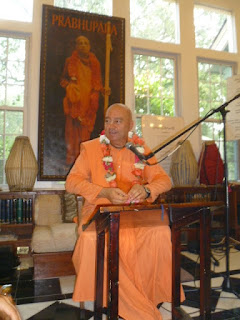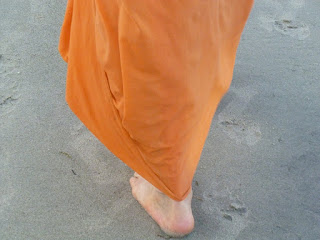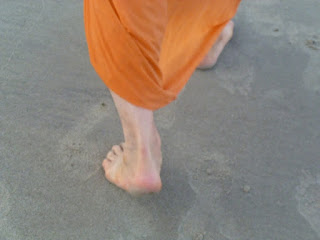A daily broadcast of the Ultimate Self Realization Course Wednesday 28 September 2011
The Supreme Personality of Godhead, Lord Sri Krishna, and His eternal consort, Srimati Radharani are enjoying transcendental pastimes in the topmost planet of the spiritual world, Sri Goloka Vrindavan. They are beckoning us to rejoin them. (Click on photo to see a larger image.)
Our Mission: To help everyone awaken their original Krishna consciousness, which is eternal, full of knowledge and full of bliss.
Such a global awakening will, in one stroke, solve all the problems of the world society bringing in a new era of unprecedented peace and prosperity for all. May that day, which the world so desperately needs, come very soon. We request you to participate in this mission by reviving your dormant Krishna consciousness and assisting us in spreading this science all over the world.
Dedicated with love to ISKCON Founder-Acharya:
His Divine Grace A.C. Bhaktivedanta Swami Prabhupada, our beloved spiritual master, and to you, our dear readers.
For Transcendental Association Connect With Other Members of this Course. Join this Conference:
http://groups.google.com/group/sda_students
Today's Thought:
From Denmark to Finland to Estonia Uploaded from Tallinn, Estonia 26 September 2011 was a full travel day for us. Immediately after mangala arati at 4:30am at the ISKCON temple in Copenhagen, Denmark we headed out to the airport to check in for an early morning flight to Helsinki, Finland. After landing in Helsinki, devotees from ISKCON's Helsinki temple picked us up and drove us to the Helsinki temple for lunch. After lunch we rested for a bit, and then we took a ship across the Gulf of Finland to Tallinn, Estonia, where the devotees greeted us with a super ecstatic kirtan and where we will be teaching the science of bhakti for a week both in and outside of Tallinn.
Sankarshan Das Adhikari
26 September 2011
After Crossing the Gulf of Finland...
http://www.backtohome.com/images/2011-Fall/Tallinn_Gulf.JPG
We Had an Ecstatic Kirtan Arrival in Tallinn, Estonia
http://www.backtohome.com/images/2011-Fall/Tallinn_Arrival.JPG
http://www.backtohome.com/images/2011-Fall/Tallinn_Arrival2.JPG
Answers by Citing the Vedic Version:
Question: Are the Vedas Mythology?
Dear Guru,
Please accept my humble obeisances.
All glories to Srila Prabhupada.
I pray that I am not asking a question that was covered before I became a member of the course or that I am doing anything to offend you or Lord Krishna. But I was watching a BBC production today on the history of India.
They talked about the great battle that happened 5,000 years ago with Arjuna and Lord Krishna. They said that the battle was nothing more than Indian mythology and that Krishna was a king at that time. What proof is there that Lord Sri Krishna is who we know Him to be, and not just a man of the time? Or are we to take this on faith? In mythology people are said to be able to do great magical things, but it does not necessarily mean that they are true. For example in one of the early cantos of the Srimad Bhagavatam it says the because of all the mining for gold the earth fell into a place of greater evil ( if you like) and that if we do not stop our oil drilling the same thing could happen to us. The Bhagavatam explains that Lord Krishna out of His infinite compassion changed Himself into a gigantic boar and lifted the earth into its proper orbit with His tusks. Please help me with my dilemma. I would like to take these things at face value, but some of them seem a bit of a stretch for me. If I cannot believe all of them, which parts should I accept as historical fact and which as mythology? Your humble servant, Bruce Answer: The Vedas Are History, Not Myth.
Because the Vedic histories describe many events that are beyond the limited experience and comprehension of modern day men, we often hear the foolish mundaners claim that the Vedic histories are mythology. But where is the proof of such a claim? There is no proof. The Supreme Personality of Godhead is unlimitedly powerful and can do anything both conceivable and inconceivable. So-called intellectuals blindly reject the authority of the Vedic literatures, but someone who is actually intelligent does not blindly accept or reject anything. All the descriptions given in the Vedic scriptures, even the most inconceivable ones, can be personally confirmed by anyone who awakens their original divine consciousness. The fools blindly say that only those things that are empirically verifiable can be accepted as true, even though the truth of this philosophical principle is not empirically verifiable. Sankarshan Das Adhikari
Transcendental Resources:
Receive the Special Blessings of Krishna Now you too can render the greatest service to the suffering humanity and attract the all-auspicious blessings of Lord Sri Krishna upon yourself and your family by assisting our mission.
Lectures and Kirtans in Audio and Video:
Link to High Definition Videos Link to Over 1,000 Lecture Audios
Lecture-Travel Schedule for 2011
http://www.ultimateselfrealization.com/schedule
Have Questions or Need Further Guidance?
Check out the resources at:
http://www.ultimateselfrealization.com or write Sankarshan Das Adhikari at: sda@backtohome.com
Get your copy today of the world's greatest self-realization guide book, Bhagavad-gita As It Is available at:http://www.ultimateselfrealization.com/store Know someone who could benefit from this? Forward it to them.
Searchable archives of all of course material:
http://www.sda-archives.com
Receive Thought for the Day as an RSS feed:
http://www.backtohome.com/rss.htm
Unsubscribe or change your email address
Follow us on Twitter:
http://twitter.com/Daily_Thought
Thought for the Day on Facebook:
http://www.facebook.com/Ultimate.Self.Realization
Copyright 2005-2011 by Ultimate Self Realization.Com
Distribution of this material is encouraged. Simply we request you to acknowledge where it is coming from with a link to our sign up page: http://www.backtohome.com Our records indicate that at requested to be enrolled to receive e-mails from the Ultimate Self Realization Course at:
This request was made on:
From the following IP address:
One morning a couple attended the lecture, a woman carrying a child and a man wearing a backpack. During the question-and-answer period the man asked,"What about my mind?" Prabhupada gave him philosophical replies, but the man kept repeating, "What about my mind? What about my mind?"
With a pleading, compassionate look, Prabhupada said, "I have no other medicine. Please chant this Hare Krsna. I have no other explanation. I have no other answer."

This is an article from the Vaisnava Family Resources Newsletter. Visit this website for more articles on marriage, parenting and family life (click the link):
www.vaisnavafamilyresources.org
Seminars a Success at Festival of Inspiration at New Vrindavana
The Grihastha Vision Team offered a number of interesting seminars at New Vrndavana's Festival of Inspiration last May. One popular seminar attended by over 70 participants, was Arcana siddhi dasi and Karnamrita das's "What About My Mind?" Following is an exerpt.
"Marriage is a meeting of two minds. Once a guest at a temple asked SP loudly, in great frustration," What about my mind?" SP answered, I have no other medicine but the holy name. Our challenge is how control the mind so that the medicine of the holy name will have full effect. Prabhupada did indeed give us many tips in his books to help us control the mind. These instructions can help us receive the full benefit of the holy name. The more we understand our mind, the less it will frustrate us. We can learn to quickly change a negative mind state into a more conducive mind state for our emotional and spiritual growth.
We may think we can't change our bad habits, like anger but the mind is malleable and we can create dramatic change in this lifetime, especially coupled with chanting. Good and bad habits are just behaviors we repeat over and over again. With a little desire and determination we can begin or stop behaviors.
The mind is the lens through which we see the world, so if the mind is dark, the world seems depressed. We want to see the world though the lens of Krsna colored glasses, where you see everything in relation with Krsna. The illusion is that the relationship is not there, but we can see the world from a Krsna conscious viewpoint.
Pain is inevitable but suffering is optional so if we can learn to use our mind in the right fashion, we can keep it in positive mind states. What we focus on expands and we have choice where we want to focus. In any relationship we can choose to act from our positive mind states."
Arcana siddhi dasi taught everyone an important formula:
O=E+R
The outcome is equal to the event plus our response. In other words the outcome is determined by how we respond to an event. This is really our only freedom in life—how we respond to people and situations. Responding with empathy and care to others helps us to grow and become more than we are now. Responding with envy, malice or anger will stifle our growth and keep us entrapped in our suffering mental condition. If things are not going well for you in a certain situation in your life, think about how you can change your response. A famous saying "If you always do what you've always done, you'll always get what you have always gotten."































One of the most powerful success strategies I know can be distilled to a 3-letter word: ASK!
Whether it's asking for advice, asking for help, asking for money, support, time or whether else you need ... asking is the most direct route to get what you want.
Unfortunately, most people are afraid to ask. They're afraid of looking weak, helpless, and vulnerable. They're afraid of hearing "no" ... so they simply don't bother to ask at all.
But the fact is, that by not asking for what you want, you are choosing to reject yourself. You're denying yourself the chance to access the support and resources you need to achieve success.
If you want to achieve your goals, you must be able (and comfortable) to ask for what you want.
Best Bonding
Tatamagouche to Wallace, NS
Out came the first aid kit and contents – the gauze, scissors, band-aids and tape. Some polysporin and tiger balm also made their entrance to heal the wounded from the previous day's walk, and to address blisters, aching knees and muscles. Making the application was at least half of our party members which consisted today again of a multicultural monk crew. We have Mirza who is Bosnian, and also claims to be Swedish; Karuna, who's a mix of German and Indian; Tirtha from Siberia, and the balance of the boys are from various parts of Canada. We, the 8 of us, decided on trekking a portion of the Trans Canada Trail. We do have choices on which way to go and this trail proved the road less travelled. In fact, we met no human souls for the whole 32 kilometres. Spotting a black bear on this trail was the only soul we saw of any bodily size. The short of the encounter was that we were singing Krishna's names. Then the young bear came out of the forest and stood on the trail ahead of us to listen. We mistook him for a black dog. Once we got close, he decided to vanish, and we saw that clearly here was a bear.
In the town of Wallace, I was asked a question, "Why are you walking?" Angela, from the Tatamagouche Light Paper came to see me during our break. And then to answer her I said, "To establish pilgrimage. I'm convinced that the best life is when we take life as a spiritual journey." We got on to discussing transmigration of the soul, karma, and how it was most important to have divine thoughts on your mind as you leave this world to ensure a more evolved next life. Unless one reaches liberation. Angela and I dove into deep topics as we sat on a picnic table by a pleasant Maritime setting, with a majestic crane perched nearby. She conveyed that her paper's circulation reaches 5,000 families. Each of which is read from cover to cover by two or three readers per copy. This is impressive as I very much want the message of pilgrimage to get out there in the public.
Overall, this was a memorable bonding day for 8 saffron clad monks going down a magnificent trail in the best weather possible.
32 KM























































Human intelligence can decide for the future. That is human intelligence. The animal cannot decide. We have discriminatory power. If I do th... (click on the title for the full text)
The following details outline a general practice by which one can prepare himself for an easy journey to the Vaikuntha (anti-material) planets, where life is free from birth, old age, disease and death.
General practice (positive functions):
1. The serious candidate must accept a bona fide spiritual master in order to be trained scientifically. Because the senses are material, it is not at all possible to realize the Transcendence by them. Therefore the senses have to be spiritualized by the prescribed method under the direction of the spiritual master.
2. When the student has chosen a bona fide spiritual master, he must take the proper initiation from him. This marks the beginning of spiritual training.
3. The candidate must be prepared to satisfy the spiritual master in every way. A bona fide spiritual master who is fully cognizant of the methods of spiritual science, learned in the spiritual scriptures such as the Bhagavad-gita, Vedanta, Srimad-Bhagavatam and Upanisads, and who is also a realized soul who has made a tangible connection with the Supreme Lord, is the transparent medium by which the willing candidate is led to the path of the Vaikunthas. The spiritual master must be satisfied in all respects, because simply by his good wishes a candidate can make wonderful progress along the path.
4. The intelligent candidate places intelligent questions to the spiritual master in order to clear his path of all uncertainties. The spiritual master shows the way, not whimsically, but in accordance with the principles of the authorities who have actually traversed the path. The names of these authorities are disclosed in the scriptures, and one has simply to follow them under the direction of the spiritual master. The spiritual master never deviates from the path of the authorities.
5. The candidate should always try to follow in the footsteps of the great sages who have practiced the method and obtained success. This should be taken as a motto in life. One should not superficially imitate them, but should follow them sincerely in terms of the particular time and circumstances.
6. The candidate must be prepared to change his habits in terms of the instructions contained in the books of authority, and for the satisfaction of the Lord he must be prepared to sacrifice both sense gratification and sense abnegation, following the example of Arjuna.
7. The candidate should live in a spiritual atmosphere.
8. He must be satisfied with as much wealth as is sufficient for maintenance only. He should not try to amass more wealth than is necessary to sustain himself in a simple way.
9. He must observe the fasting dates, such as the eleventh day of the growing and waning moon.
10. He must show respect to the banyan tree, the cow, the learned brahmana and the devotee. These are the first stepping-stones toward the path of devotional service. Gradually one has to adopt other items, which are negative in character:
11. One should avoid offenses in the discharge of devotional service and in chanting the holy names.
12. He should avoid extensive association with nondevotees.
13. He must not take on unlimited disciples. This means that a candidate who has successfully followed the first twelve items can also become a spiritual master himself, just as a student becomes a monitor in class with a limited number of disciples.
14. He must not pose himself as a vastly learned man simply by quoting statements in books. He must have solid knowledge of the necessary books without superfluous knowledge in others.
15. A regular and successful practice of the above fourteen items will enable the candidate to maintain mental equilibrium even amidst great trials of material loss and gain.
16. In the next stage, the candidate does not become afflicted by lamentation and illusion.
17. He does not deride another's mode of religion or worship, nor does he deride the Personality of Godhead or His devotees.
18. He never tolerates blasphemy against the Lord or His devotees.
19. He should not indulge in the discussion of topics dealing with the relationship between man and woman; nor should he engage in useless topics concerning others' family affairs.
20. He should not inflict pain -- either in body or in mind -- upon other living beings, whomsoever they may be.
Out of the above twenty items, the first three positive items are imperative and most essential for the serious candidate.
Easy Journey To Other Planets by His Divine Grace A.C. Bhaktivedanta Swami Prabhupada
As advised in Chapter Thirteen of the Bhagavad-gita (13.8-12), one should culture knowledge in the following way:
(1) One should become a perfect gentleman and learn to give proper respect to others.
(2) One should not pose himself as a religionist simply for name and fame.
(3) One should not become a source of anxiety to others by the actions of his body, by the thoughts of his mind, or by his words.
(4) One should learn forbearance even in the face of provocation from others.
(5) One should learn to avoid duplicity in his dealings with others.
(6) One should search out a bona fide spiritual master who can lead him gradually to the stage of spiritual realization, and one must submit himself to such a spiritual master, render him service and ask relevant questions.
(7) In order to approach the platform of self-realization, one must follow the regulative principles enjoined in the revealed scriptures.
(8) One must be fixed in the tenets of the revealed scriptures.
(9) One should completely refrain from practices which are detrimental to the interest of self-realization.
(10) One should not accept more than he requires for the maintenance of the body.
(11) One should not falsely identify himself with the gross material body, nor should one consider those who are related to his body to be his own.
(12) One should always remember that as long as he has a material body he must face the miseries of repeated birth, old age, disease and death. There is no use in making plans to get rid of these miseries of the material body. The best course is to find out the means by which one may regain his spiritual identity.
(13) One should not be attached to more than the necessities of life required for spiritual advancement.
(14) One should not be more attached to wife, children and home than the revealed scriptures ordain.
(15) One should not be happy or distressed over desirables and undesirables, knowing that such feelings are just created by the mind.
(16) One should become an unalloyed devotee of the Personality of Godhead, Sri Krsna, and serve Him with rapt attention.
(17) One should develop a liking for residence in a secluded place with a calm and quiet atmosphere favorable for spiritual culture, and one should avoid congested places where nondevotees congregate.
(18) One should become a scientist or philosopher and conduct research into spiritual knowledge, recognizing that spiritual knowledge is permanent whereas material knowledge ends with the death of the body.
These eighteen items combine to form a gradual process by which real knowledge can be developed.
Isopanisad, Mantra 10, Purport

Bali Maharaja passed the severe test put before him by the Supreme Personality of Godhead.
This is further proof of the Lord's mercy toward His devotee.
The Supreme Personality of Godhead sometimes puts a devotee to severe tests that are almost unbearable.
One could hardly even live under the conditions forced upon Bali Maharaja.
That Bali Maharaja endured all these severe tests and austerities is the mercy of the Supreme Lord.
The Lord certainly appreciates the devotee's forbearance, and it is recorded for the future glorification of the devotee.
This was not an ordinary test.
Hardly anyone could survive such a test, but for the future glorification of Bali Maharaja, one of the mahajanas, the Supreme Personality of Godhead not only tested him but also gave him the strength to tolerate such adversity.
The Lord is so kind to His devotee that when severely testing him the Lord gives him the necessary strength to be tolerant and continue to remain a glorious devotee.
So what is the test that Bali Maharaja passed?
Although bereft of his riches, fallen from his original position, defeated and arrested by his enemies, rebuked and deserted by his relatives and friends, although suffering the pain of being bound and although rebuked and cursed by his spiritual master, Bali Maharaja, being fixed in his vow, did not give up his truthfulness. ... He did not give up religious principles, for he is true to his word.
Srimad Bhagavatam 8.22.31

SB 1.9.16 text:
O King, no one can know the plan of the Lord [Sri Krsna]. Even though great philosophers inquire exhaustively, they are bewildered.
>From Srila Prabhupada's purport:
...since time immemorial no one, including such demigods as Siva and Brahma, could ascertain the real plan of the Lord. So what can we understand about it? It is useless also to inquire about it. Even the exhaustive philosophical inquiries of sages cannot ascertain the plan of the Lord. The best policy is simply to abide by the orders of the Lord without argument.

Dallas Morning News,
Each week we will post a question to a panel of about two dozen clergy, laity and theologians, all of whom are based in Texas or are from Texas. They will chime in with their responses to the question of the week. And you, readers, will be able to respond to their answers through the comment box.
When Christian broadcaster Pat Robertson told a caller on his TV show that a married man dating another woman because his wife was suffering from Alzheimer's "should divorce and start all over," it caused a predictable reaction. Even his co-host reminded Robertson that couples vow to remain together "for better or for worse, for richer, for poorer." But Robertson did not back off: "I hate Alzheimer's. It is one of the most awful things because, here is a loved one, this is the woman or man that you have loved for 20, 30, 40 years, and suddenly, that person is gone. They're gone. They are gone." Alzheimer's, he said, "is a kind of death." And he said he would not put a "guilt trip on someone who divorced for such a reason."
What to make of this? Conservative Christian leaders were swift to condemn Robertson's remarks. But as the New York Times reported, many doctors and patient advocates had a more complex response - some suggesting that he had broached an important subject, how spouses and other family members of dying patients can prevent their lives from being engulfed and start to move on.
How do we reconcile the practical and moral conflicts in Robertson's advice? Is it ever right to divorce a spouse suffering from Alzheimer's? What is the morally acceptable thing for people who develop new relationships while caring for a spouse in the last stages of Alzheimer's?
Our Texas Faith panel weighs in with some provocative, and often surprising, answers on a very difficult issue.
NITYANANDA CHANDRA DAS, minister of ISKCON (International Society for Krishna Consciousness), Dallas
The by-product of religion, or spiritual connection is satisfaction and selflessness. Those who are not connected with God seek the outer path, as hinted last week by our panelist Ric Dexter. They seek to satisfy the self or extended self. However those who first of all have the basic understanding of the soul, that the self is different from the body, do not look for externals for comfort, for they are connected with God. Thus a true practitioner does not see others with the eye of exploitation.
What is the eye of exploitation? It is when we view others as objects of enjoyment, thinking "what can this person do for me?" Because in America we do not have a God conscious culture rather we have a iGod conscious culture we cannot have steady relationships. As soon as person is no longer useful for the others gratification there is divorce. Whereas in India there is a remnant of spiritual culture remaining. Marriage is held together by the sense of duty. That I have a duty to God, society, and saints to properly uphold the marriage institution. Therefore I am duty bound to protect and care for my spouse, regardless of how difficult it is. Such duty is purifying for our heart and produces spiritual realizations.
Life is meant for shreyas, working for ones ultimate good, rather than preyas, instant gratification. Living a life for your own gratification only produces dissatisfaction. On a side note one who at the age of 80, at the door step of death should not seek additional relationships but rather should marry themselves to God.
Only that person who is ready to renounces everything (home, wealth) to work for the highest good is permitted renounce family ties and thus be a sannyasi.
"A person who is not disturbed by the incessant flow of desires -- that enter like rivers into the ocean, which is ever being filled but is always still -- can alone achieve peace, and not the man who strives to satisfy such desires." -Bhagavad Gita As It Is 2.70

Jenny G from Milsons Point in Sydney wrote: "Hello Kurma, I am a great fan of your work. Can you share a recipe for Baklava with me?"
My reply: Yes!

Turkish Nut Pastries in Syrup (Baklava)
Baklava is probably one of the best known of all Middle Eastern sweets. In this delightful version of Turkish origin, sheets of buttered wafer-thin filo pastry are layered with nuts and baked; then they're soaked in a lemon and orange-blossom flavoured sugar and honey syrup.
Preparation & cooking time: about 1 hour 5 minutes Baklava soaking time: overnight, or at least 2 hours Makes: about 18 large pieces
Pastries 450g (1 pound) filo pastry (about 30 sheets) 250g (9 ounces) unsalted butter, melted 250g (9 ounces) finely chopped walnuts (or almonds, pistachios, or a combination) 1 teaspoon cinnamon powder ¼ cup sugar
Syrup 1¼ cups sugar 1 cups water 2 tablespoons lemon juice ¼ cup honey 1 tablespoon orange-blossom water (available at Middle Eastern grocers)
Butter a 28cm x 18cm (11-inch x 7-inch) tin. If necessary, cut the pastry the size of the tin.
Place one sheet of pastry on the bottom of the tin and butter it with a pastry brush. Repeat for half the pastry (about 15 sheets).
Combine the nuts, cinnamon, and sugar.
Sprinkle the mixture evenly over the top layer of buttered filo pastry. Continue layering the remaining pastry on top of the nut mixture, again brushing each layer of pastry with melted butter. After the final layer of pastry is placed on top, brush it with butter.
Carefully cut the tray of pastry into diagonal diamond shapes with a sharp knife, cutting directly to the base.
Bake in a moderate oven 180°C/355°F for about 45 minutes or until the top is crisp and golden.
Combine the sugar, water, and lemon juice in a pan, stir over low heat to dissolve the sugar, and then boil for 5 minutes. Remove from the heat, add the honey, stir to dissolve, and add the orange-blossom water.
Pour the hot syrup over the cooked baklava. Let set for at least 2 hours, or for best results leave overnight for the syrup to be fully absorbed.

The Hudson reminded me of the Ganges last night.
Last night I arrived in NYC again, skimming over the Hudson at sunset to touch down in the city once more.
I’ve been saying my mantra ‘I’m trying not to travel – it just keeps happening!’ Needless to say, I must not be trying very hard, because my wheels keep turning. This month I came from England straight to LA, to Joshua Tree, to Santa Barbara, to Laguna Beach, to Florida, and now back in the Big Apple. It’s all connected in an attempt to take kirtan wherever there is an enthusiasm for it, but it can sometimes feel like living in a series of trailers. Movie trailers that is, not Winnebagos. The people around me are changing all the time – the places, the pillows, the temperature. I try and stay as adaptable as I can, but it can be overwhelming at times. As soon as you adjust, you’re changing again. There are only a few constants in the midst of it all.
One is my personal sadhana – my japa meditation that I do every day. Though I sometimes struggle with time zone changes to get up early and do it first thing, and doing it on the plane is an exercise in fighting every kind of distraction possible, if I give it priority, it gives focus and spiritual strength to my life on a daily basis. The other is unfortunately, my laptop. Staying connected with the world through email, Skype, and though I hate to say it, Facebook, gives some continuity. It’s alright I suppose – a symptom of our modern age. But sometimes I worry that looking at a screen becomes easier than interacting with those around me. Sometimes you just don’t want to answer the same old questions again, or tell your life history to yet another new set of perfectly well intentioned people.
I’ve always been shy, so this is something I’ve thought about a lot in my life. What is the value of making the endeavour to connect personally? In gaining confidence, and trying to remember that my laptop and phone are just tools for genuine human exchange, it’s getting easier to realise that the true and deep connection between people is magical. Closing the email inbox and opening myself to an unexpected conversation in person has often had the most extraordinary consequences, within and without. It’s common sense, but sometimes that’s not so common.
I attribute so much of anything going right in my life to encouragement and love from others. There is a quality of energy exchange that seems to be able to transform, from the inside out. All the more so in person, as I have been experiencing lately. Though there are all too many people whose kind words are only niceties, there are also an equal amount who really mean what they say. If words took physical shape and form as they emerged, perhaps they’d be jewels.
Electric communication will never be a substitute for the face of someone who with their soul encourages another person to be brave and true. – Charles Dickens








By Pusta Krishna das
Somewhere along the line, the boundary between Krishna Consciousness and narcissism has become blurred. This is not very surprising because we live in the material world with a desire to occupy the lofty and unique position of Sri Krishna Himself. Krishna, however, is ajita, undefeatable, being the Summum Bonum, the Creator of all, and the only true Enjoyer with his creation as His property
 •
• •
• •
• •
• •
• •
• •
• •
• •
• •
• •
• •
•
 •
•
 •
• •
•






















































































